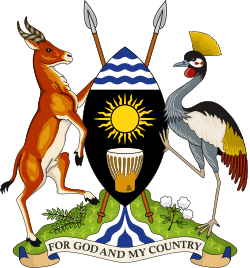Tito Okello
| Tito Lutwa Okello | |
|---|---|
 | |
| 8th President of Uganda | |
|
In office 29 July 1985 – 26 January 1986 | |
| Preceded by | Bazilio Olara-Okello |
| Succeeded by | Yoweri Museveni |
| Personal details | |
| Born |
1914 Kitgum District, Uganda |
| Died |
3 June 1996 (aged 81) Kampala, Uganda |
| Military service | |
| Allegiance |
|
| Service/branch |
British Army Uganda Army Uganda National Liberation Army (UNLA) |
| Years of service |
1940 - 1962 (UK) 1962 - 1971 (Uganda Army) 1979 - 1986 (UNLA) |
| Rank | General |
| Unit | King's African Rifles |
| Battles/wars | East African Campaign |
General Tito Lutwa Okello (1914–1996) was a Ugandan military officer and politician. He was the President of Uganda from 29 July 1985 until 26 January 1986.[1]
Background
Tito Okello was born into an ethnic Acholi family in circa 1914 in Nam Okora, Kitgum District.[2]
He joined the King's African Rifles in 1940 and served in the East African Campaign of World War II. As a career military officer, he had a variety of assignments.
Okello was one of the commanders in the coalition between the Tanzania People's Defence Force and the Uganda National Liberation Army, who removed Idi Amin from power in 1979. He was selected to be the Commander of the Ugandan National Liberation Army from 1980 to 1985.[1]
Coup d'état
In July 1985, together with Bazilio Olara-Okello, Tito Lutwa Okello staged the coup d'état that ousted president Milton Obote. He ruled as president for six months until he was overthrown by the National Resistance Army (NRA) operating under the leadership of the current president, Yoweri Museveni. He went into exile in Kenya after he was ousted.[2]
Extended family
Tito Okello's son Henry Oryem Okello is the current State Minister for Foreign Affairs responsible for International Affairs.[1][2] In 2002, Tito Okello's younger brother, Erisanweri Opira, was abducted from his home in Kitgum District by the rebel group, the Lord's Resistance Army (LRA). His abduction was considered unusual as the LRA usually kidnapped teenagers and young people to use as prospective soldiers or sex slaves. Opira was in his late seventies when he was abducted.[3]
Final years
Okello remained in exile until 1993, when he was granted amnesty by President Museveni and returned to Kampala. He died three years later, of an undisclosed illness, on 3 June 1996. He was almost 82 years old at the time of his death. His remains were buried at his ancestral home in Kitgum District.[4]
Legacy and honours
In January 2010, Okello was posthumously awarded the Kagera National Medal of Honor for fighting against the Idi Amin dictatorship in the 1970s.[5]
See also
- Uganda since 1979, part of the History of Uganda series.
- President of Uganda
- Politics of Uganda
- Okello Oryem
References
- 1 2 3 Uganda State House, . "President Tito Okello Lutwa (General)". Statehouse.go.ug. Retrieved 16 February 2015.
- 1 2 3 Titus Kakembo, and Joel Ogwang (25 January 2012). "Tito Okello: The President Who Was Kept On His Toes". New Vision (Kampala). Retrieved 16 February 2015.
- ↑ Ross, Will (24 July 2002). "Uganda Rebels Grab Ex-President's Brother". BBC News (London). Retrieved 16 February 2015.
- ↑ ASP, . (10 June 1996). "General Tito Okello, Ex-Ugandan Leader, 82". New York Times Quoting Associated Press (ASP). Retrieved 16 February 2015.
- ↑ Milton Olupot, and Daniel Edyegu (26 January 2010). "Museveni, Janet, Moi Get National Medals". New Vision (Kampala). Retrieved 16 February 2015.
External links
| Political offices | ||
|---|---|---|
| Preceded by Bazilio Olara-Okello |
President of Uganda 29 July 1985 - 26 January 1986 |
Succeeded by Yoweri Museveni |

